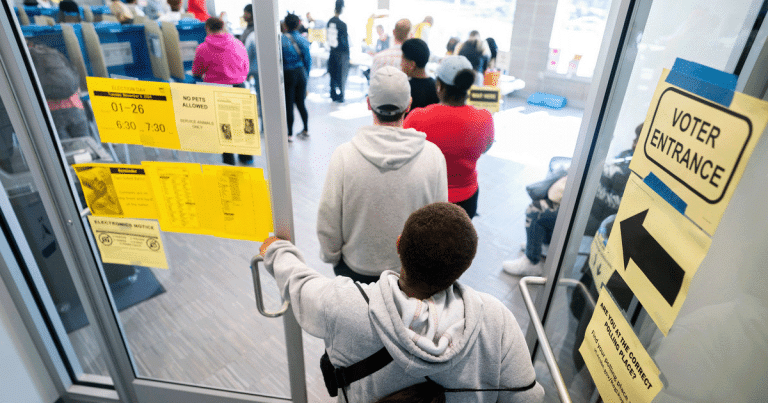
Another election, another round of epic polling failures. For years, the media and polling firms have pushed predictions as if they were gospel. Yet each cycle seems to expose their flaws even more. This election was no different.
Pollsters confidently predicting a “close race” between Donald Trump and Kamala Harris. Spoiler alert: it wasn’t close at all. Trump didn’t just win—he won by a landslide, taking both the electoral and popular votes. And now the media is left scrambling to explain why their beloved polls were, once again, completely wrong.
Among all the inaccurate polls, one stood out for how shockingly off-base it was. Just days before the election, this poll claimed Harris was leading Trump in a reliably red state. The media jumped on this poll, in an effort to deflate Trump’s momentum. Trump won that state by a wide margin.
Now, this “respected” pollster is losing major ground.
From Fox News:
Pollster J. Ann Selzer is “reviewing her data” to determine why her pre-election poll, which set off a multi-day media firestorm, inaccurately showed Vice President Kamala Harris leading in Iowa…Selzer, president of Selzer & Co., who conducted the poll, declared Harris had clearly “leaped into a leading position” ahead of Election Day…
Selzer had egg on her face when the Fox News Decision Desk called Iowa for Trump on Tuesday night with the former president holding a commanding lead.
The Selzer Fiasco: A Poll Gone Wrong
J. Ann Selzer, often praised as one of the “best pollsters in politics,” missed the mark in a spectacular fashion. Her final Iowa poll suggested a seven-point swing from Trump to Harris, showing Harris up by 47% to Trump’s 44%.
The media celebrated this as a groundbreaking shift, with Rachel Maddow and others declaring it a sign of Harris’s newfound popularity. “If anybody is accurate, it’s likely to be Ann Selzer,” Maddow gushed. CNN panelists echoed the sentiment, describing Selzer’s track record as “always right.”
But on election night, when Iowa overwhelmingly went to Trump, Selzer’s poll looked less like good data and more like wishful thinking. Fox News called Iowa for Trump early, with the former president leading by a comfortable margin. Iowa voters, it turns out, weren’t swayed by Harris’s progressive platform.
Instead, they backed Trump in numbers that completely contradicted Selzer’s forecast. Trump supporters were quick to mock Selzer’s erroneous polling, with co-campaign manager Chris LaCivita posting, “Enjoy retirement,” in response to the wildly inaccurate numbers.
Integrity Questions: Was It Just Bad Data, or Bias?
Now, Selzer is in the hot seat, scrambling to explain her poll’s inaccuracy. She issued a statement expressing disappointment and said she would be “reviewing data from multiple sources” to understand what went wrong. But some observers aren’t buying it.
How could someone with Selzer’s reputation misread the mood in Iowa, a reliably red state, to such an extent? Critics argue that Selzer’s poll may have reflected more than just flawed methodology. Was it an honest mistake, or were her results influenced by a media narrative that desperately wanted Harris to appear competitive?
Shawn Carney, founder of the pro-life organization 40 Days for Life, suggested that the pollsters and media were pushing a narrative they wanted to believe. “The media ran with this narrative because it’s what they wanted to believe was true,” Carney said. He argued that pollsters like Selzer made arrogant assumptions, including the idea that women’s votes are driven by single issues like abortion.
The Iowa poll, in Carney’s view, demonstrated just how out of touch some pollsters are with the real concerns of everyday Americans, who are more focused on economic stability, safety, and family.
Poll-Driven Media: How They Got It Wrong
It’s no secret that the media loves polling. They can craft entire narratives around numbers that reinforce their perspective, and that’s exactly what happened with Selzer’s Iowa poll. The idea that Harris was closing the gap with Trump in a Midwestern state like Iowa fit neatly with the media’s hopes.
Talking heads on MSNBC, CNN, and The View were ecstatic, using the poll to claim that Harris’s support was rising across the Midwest. But it was all smoke and mirrors. When the real votes were counted, the supposed swing to Harris turned out to be a mirage.
The media’s reliance on polling as a news story in itself is an ongoing problem. Instead of reporting on real issues that matter to voters—like inflation, crime, and border security—media outlets use polls to try and set the narrative.
But each election cycle exposes how unreliable these polls can be. For the average American, this election was a clear example of why they should take pre-election polling with a big grain of salt.
The Message from Iowa: Polling Needs a Reality Check
For J. Ann Selzer and other pollsters, this election was a wake-up call. The “scientific” process of polling has lost credibility with voters who are tired of hearing predictions that don’t match reality. Iowa’s decisive vote for Trump sent a message: voters want solutions, not spin.
The media, eager to push a story of Harris’s growing popularity, bought into polling that didn’t hold up. Now, the credibility of major polling firms is in question, and voters are left wondering whether they can trust polls at all.
Selzer may review her data and come up with explanations for her error, but that won’t change the outcome. Trump’s victory in Iowa—and across the nation—shows that Americans are looking for more than progressive talking points. Pollsters and pundits would do well to remember that.
Key Takeaways
- Pollsters like J. Ann Selzer vastly underestimated Trump’s support, predicting a close race that ended in a landslide.
- Media outlets used inaccurate polls to push a narrative of Harris’s growing popularity, which didn’t materialize.
- Americans are increasingly skeptical of polling and the media’s reliance on it as a “news” story.
Source: Fox News


